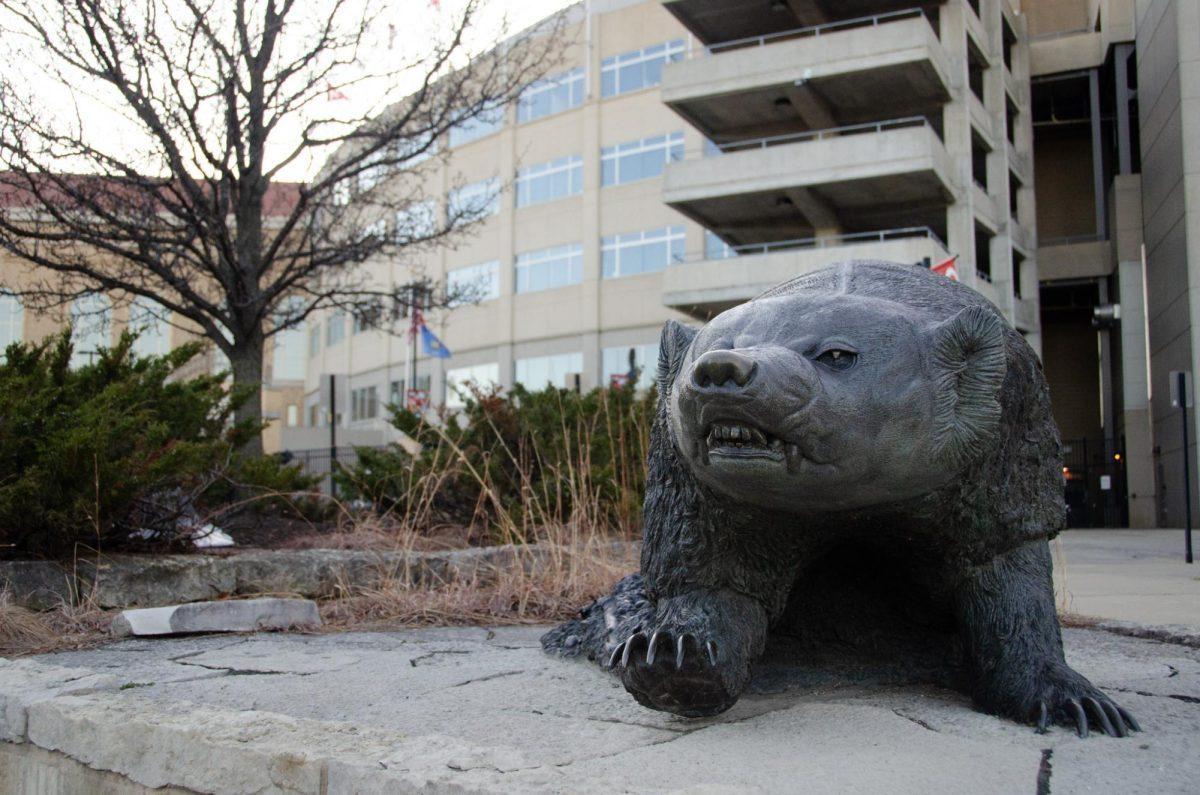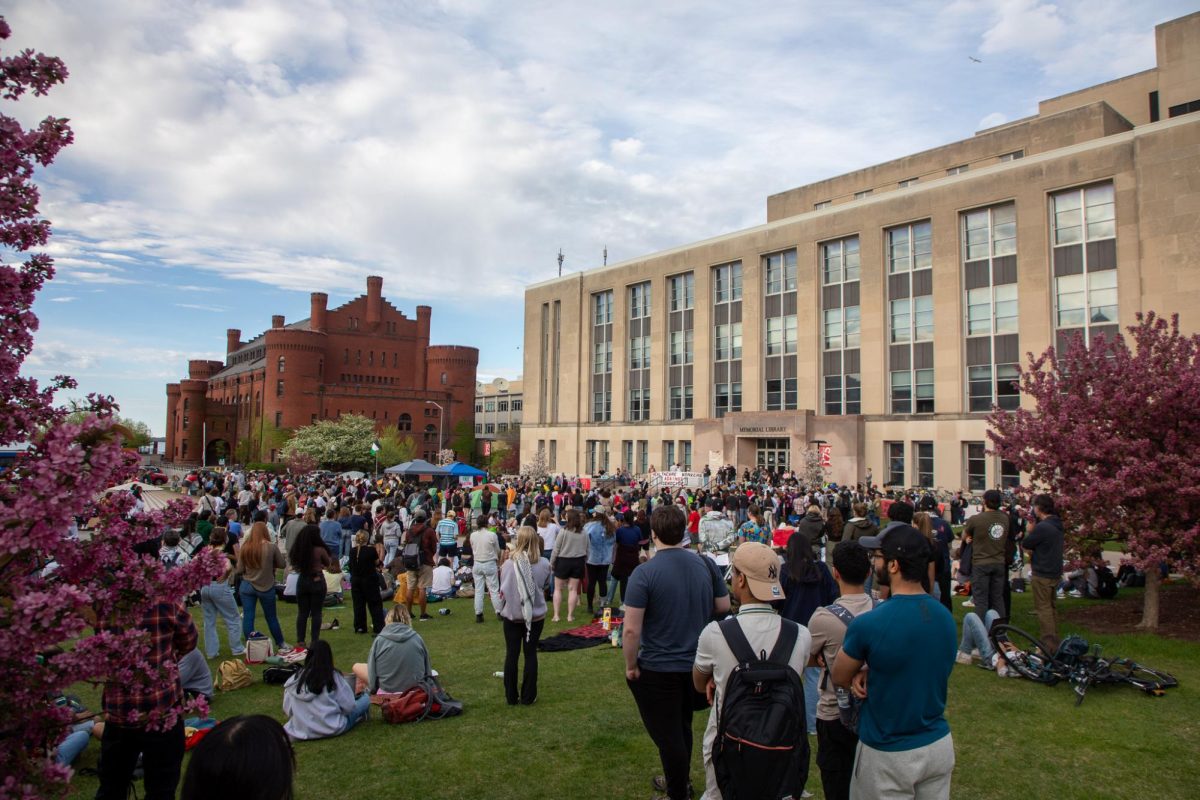University of Wisconsin senior Elizabeth Yurish was feeding elephants in Tsitsikamma National Park, South Africa, while thousands of miles away, fellow UW senior Erica Efron attempted to navigate the narrow medieval streets of Prague, Czech Republic.
Every year, thousands of students stuff their backpacks, grab their passports and hop on a plane to begin what many consider the “adventure of a lifetime.”
According to the Institute of International Education, the number of American students studying abroad has steadily increased since the mid-1980s. Nearly 50,000 students studied abroad in 1985, while 223,534 college students took classes abroad in 2005.
UW has mirrored the international trend, with International Academic Programs sending 1,251 students abroad in 2007-08, up from 860 students just three years earlier. In addition to taking classes abroad in higher numbers, American students are also diversifying the places they choose to make their temporary home.
IIE’s 2007 annual report said the increases in numbers of students studying abroad “reflect a growing interest in non-traditional destinations,” with students going to Asia, Latin America, Africa and the Middle East.
Although students now have the opportunity to explore a variety of vastly different and remote regions of the world, many often share a common experience of facing unforeseen logistical hurdles and unexpected detours along the way.
Czech the rules
With such large numbers of students venturing to the far corners of the globe, several students found getting to their final destination to be harder than expected.
Many American students have recently experienced difficulty obtaining and processing visas necessary for an extended stay abroad.
Efron attended Prague’s Charles University in spring 2008 through the Council on International Education Exchange program offered at UW.
Prior to departing, Efron was told by both International Academic Programs and CIEE she did not need a visa to participate in the study abroad program. But Efron soon found this not to be true.
Upon arriving in Prague, Efron was informed she would not be allowed to remain in the country for more than 90 days without a visa.
“The Czech Republic was kind of transitioning their policy, so CIEE was encouraging you to apply (for a visa), but they didn’t quite think it was mandatory,” Efron said. “A lot of students arrived without onewhich they had been told would be OK, but [upon arrival] they were told, ‘No, you need to get one.'”
Efron was forced to FedEx her passport from Prague to her home in California so the Czech Consulate in Los Angeles could process her visa.
“Sending your passport home over the ocean is not a safe policy,” Efron said. “I was holding my breath until my mom called me and said she got it.”
The logistical problems were a hassle on both sides of the Atlantic, Efron said. While she missed a trip to Munich because her passport was in the United States, her mother was forced to make five trips to the Czech Consulate in downtown Los Angeles to resolve the issue.
Efron said the process was so difficult she felt the “Czechs didn’t even want me in their country,” adding the process and paperwork “just created unnecessary stress.”
Like Efron, University of Southern California senior Alex Wagmeister was told by CIEE he did not need a student visa for his semester at Charles University. While in Prague, Wagmeister learned he had been misinformed and needed a visa in order to remain in the country.
“We could only legally stay in the Czech Republic for three months and then we’d get deported,” Wagmeister said. “It would take longer than that to get a visa while in Prague, so the Czech Embassy in Slovakia said they could do it for us.”
Wagmeister had to make two five-hour trips to Bratislava, Slovakia to obtain the paperwork necessary for him to complete his study abroad program.
“They didn’t really give me the right information,” Wagmeister said. “The study abroad office [at USC] should have known and told me to make sure to get a visa before I go.”
Katie Saur, IAP study abroad adviser, said the large size of the CIEE program prevents their staff from providing visa processing services to students.
Applying for a visa and completing the necessary paperwork far in advance is just part of the process of studying abroad, Saur said, adding IAP tries to help students “as much as possible.”
The necessary paperwork has increased not only for entrance to the Czech Republic but many countries popular with study abroad students, she said.
“Visas are becoming more and more common,” Saur said. “Part of it might be reciprocal. Citizens of other countries have to go through a pretty lengthy visa process to study in the U.S.”
After dealing with visa issues, Efron said she “gives foreign students props for wanting to come here because it’s a horrible process.”
The cost of a foreign education
The cost of a college education is considerably higher in the United States as compared to the rest of the world, and the amount of cash required for a study abroad program hedges on a plethora of variables — location, duration, visa costs and number of credits obtained while abroad.
There is no doubt students gain invaluable skills and an increased global understanding by learning in another country, but studying abroad can be expensive. From the weak U.S. dollar to soaring gas prices, students often find their bank accounts severely depleted upon returning home.
UW senior Alex Martinsons suggests saving up before studying in Europe because “everything is really expensive.”
“You’re going to spend a lot more money than they say you are,” he said.
But Associate Director for International Academic Programs Julie Lindsey said finances should not prevent any UW student from studying abroad. Given the state of the U.S. economy, Lindsey added, students may be needier than in previous years.
“Money is such an issue right now,” Lindsey said. “It’s important that folks know we gave over $350,000 away in study abroad scholarships last year.”
To help students apply for monetary aid, IAP built the scholarship application into the online study abroad application, a move Lindsey hopes will help “actively seek out scholarships for students for study abroad.”
UW does not charge students tuition during their time abroad, as the program costs are comprised of IAP fees and tuition at the host institution. Different IAP programs thus cost different amounts, a system Lindsey said brings the total cost down for students.
Unlike UW, Wheaton College in Norton, Mass., charges students a flat tuition rate whether they spend their semester at Wheaton or abroad.
Wheaton College’s policy is cause for debate and has sparked a lawsuit that claimed requiring a student to pay full tuition, room and board while overseas to be a deceptive practice.
Attorney James Brady — who plans to file a case against Wheaton College in the next few weeks — said he had to pay Wheaton College tuition, room and board in order for his daughter’s credits to transfer from her study abroad program in South Africa back home.
“There is about a $6,000 discrepancy between what the overseas program charged and what Wheaton charged,” Brady said. “They make between $4,000 and $7,000 for each student they send overseas per semester.”
Brady claims this practice is both “deceptive and predatory,” as Wheaton “never informs parents or students that the college is making thousands and thousands of dollars for every student studying abroad.”
Despite not charging tuition, the cost of going abroad through UW is often much higher than the tuition charged by a host country.
The UW program cost for studying at the University of Cape Town in South Africa, for example, is $5,700 for in-state students and $11,700 for out-of-state students. But according to UCT’s website, the semester fee is 11,500 rand, or approximately $1,452.
Yurish said she feels she paid too much for her semester at UCT.
“I paid about five times more than the average UCT student,” Yurish said. “I guess I wish it was prorated to fit actual Africa tuition.”
Despite the tuition discrepancy between UW and international institutions, one perk of studying through a UW program is the assurance all credits will equate back to the university.
UW senior Erika Kramer, who studied abroad through University of Virginia’s Semester at Sea program, said UW’s sociology department would not transfer a sociology class offered through SAS, despite her multiple meetings with an academic adviser.
“The department wouldn’t accept one of the upper-level sociology classes because they thought it wasn’t legit for UW,” Kramer said. “It’s disappointing because I ended up not taking the class, and it could have been a good experience.”
Global benefits
Living and learning in a foreign country gives students an edge in the job market in today’s globalized business world. UW’s School of Business has recognized the importance of global understanding, and according to faculty director of the Center for International Business Education and Research Randall Dunham, studying abroad benefits any student.
The UW School of Business requires international business majors to study abroad but highly recommends all students to learn in a foreign country.
“Providing the right learning abroad opportunities is critically important for intellectual development, to evolve ways of thinking and to develop the global competencies that can help our graduates have a competitive advantage when they enter the job market,” Dunham said in an e-mail to The Badger Herald.
The faculty of the School of Business, Dunham added, voted last year to develop opportunities for all undergraduates to learn abroad.
Once adequate international programming is available, Dunham said, he believes foreign learning will be “sought after by students.”
Lindsey echoes Randall’s beliefs, adding students learn invaluable lessons and have “a greater understanding for those from different cultures” upon completing a study abroad program.
CIEE and Wheaton College did not return calls seeking comment as of press time.
















